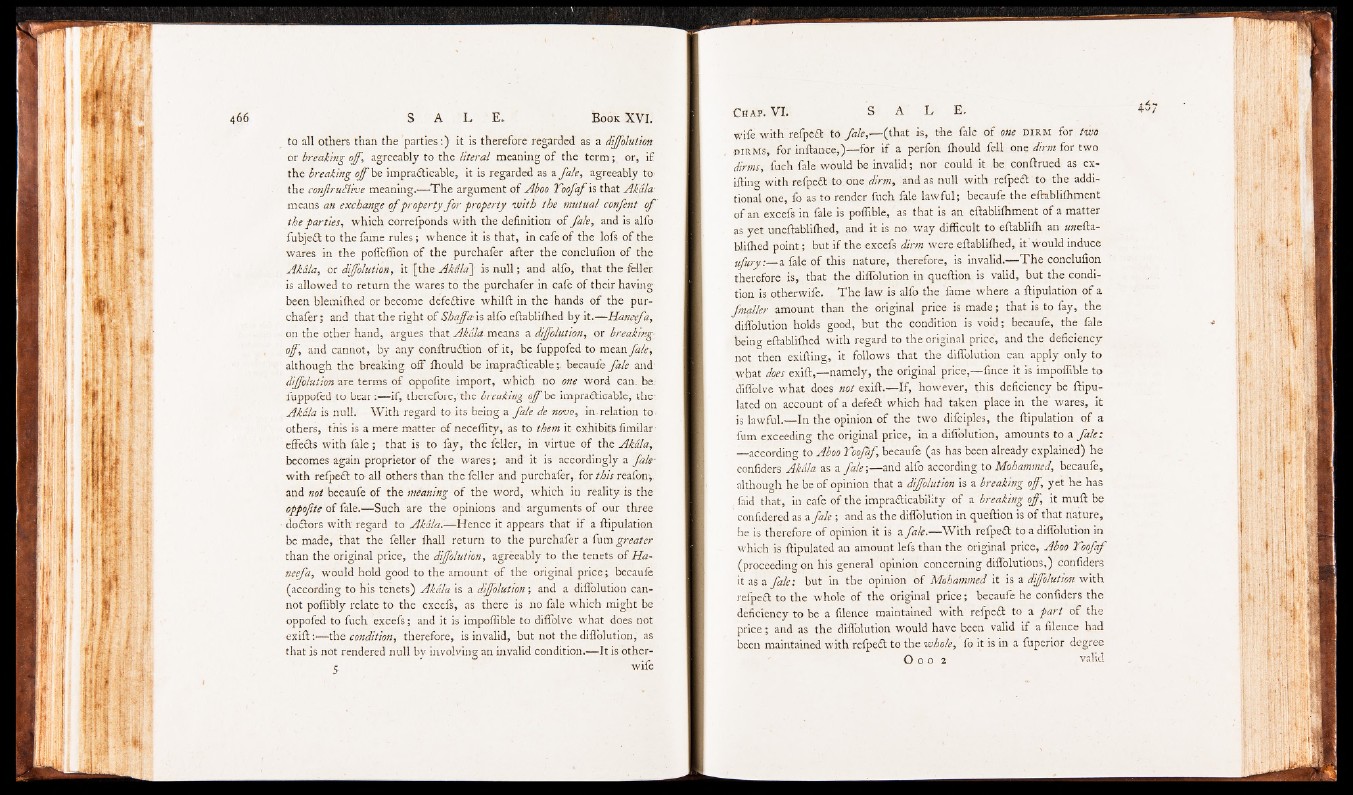
to all others than the parties:) it is therefore regarded as a diffolution
or breaking off, agreeably to the literal meaning of the term; or, if
the breaking off be impracticable, it is regarded as a /ale, agteeably to-
the conjlru&ive meaning.— The argument of Aboo Toofqf is that Akdla-
means an exchange ofproperty fo r property with the mutual confent o f
the parties, which correfponds with the definition of /ale, and is alfo
fubjeft to the fame rules; whence it is that, in cafe of the lofs of the
wares in the pofleflion of the purchafer after the conclufion of the
Akdla, or diffolution, it [the Ak dld\ is null; and alfo, that the-feller,
is allowed to return the wares to the purchafer in cafe of their having
been blemifhed or become defective whilft in the hands of the purchafer;
and thatthe right of Shaffais alfo eftablifhed by it.— Haneefa,
on the .other hand, argues that Akdla means a diffolution, ox breaking-
off, and cannot, by any conftruction of it, be fuppofed to mean _/«/.?;
although the breaking, off fhould be impracticable^ becauie f ile and
diffolution are terms of oppofite import, which no one vvord can. be.
fuppofed to bear:— if, therefore,' the breaking off be impracticable, the-
Akala is null. With regard to its being a file de novo, in.relation toothers,
this is a mere matter of neceffity, as to them it exhibits fimilar
effects with fale ; that is to fay, the feller, m virtue of the Akdla,
becomes again proprietor of the wares y and it is accordingly a file -
with refpect to all others than the feller and purchafer,! for r&f reafon-,,
and not becaufe of the meaning of the word, which in reality, is the
oppofite of fale.— Such are the opinions and arguments of our three
doCtors with' regard to Akala.-— Hence it appears that if a ftipulation
be made, -that the feller fhall return to the purchafer a fum greater
than the original price, the diffolution, agreeably to the tenets of Haneefa,
would hold good to the amount of the original price; becaufe
(according to his tenets) Akdla is a diffolution; and a diffolution cannot
poflibly relate to the excefs, as there is no fale which might be
oppofed to fuch excefs; and it is impoffible to diflolve what does not
exift:— the condition, therefore, is invalid, but not the difiolution, as
that is not rendered null by involving an invalid condition.— It is other-
c wife
wife with refpect: to fale,-— (that is, the fale of one d ir m for two
3dirm!s, for inftance,)— for if a perfon fhould fell one, dirm for two
dirms, fuch fale'would be invalid; nor could it be con ft rued as exiting
with refpeCt to one dirm, and as null with refpeCt to the additional
one, fo as to render fuch fale lawful; becaufe the eftablifhment
of an excefs in fale is poffible, as that is an eftablifhment of a matter
as yet uneftablifhed, and it is no way difficult to eftablifh an «»eftablifhed
point; but if the excefs dirm were .eftablifhed, it would induce
ufiry:— a fale of this nature, therefore, is invalid.— T h e conclufion
therefore is, that the diffolution in queftion is valid, but the condition
is otherwife. The law is alfo the fame where a ftipulation of a
fmaller amount than the original price, is made; that is to fay, the
diffolution holds good, but the condition is void; becaufe, the fale
being eftablifhed with regard to the original price', and the deficiency
not then exifting, it follows that the difiolution can apply .only to
what does exift,— namely, the original price,— fince it is impoffible to
diffolve what does not exift.— If, however, this deficiency be ftipu-
lated on account of a defeat which had taken place in the wares, it
is lawful.— In the opinion of the two difciples, the ftipulation of a
fum exceeding the original price, in a difiolution, amounts to.a fale:
— according to Aboo Toofdf, becaufe (as has been already explained) he
confiders Akala as a fale-,— and alfo according to Mohammed, becaufe,
although he be of opinion that a diffolution is a breaking off, yet he has
faid that, in cafe of the impra&icabiiity of a breaking off, it muft be
confidered as a fale ; and as the diffolution in queftion is of that nature,
he is therefore of opinion it is a fale.— With refpeft to a diffolution in
which is ftipulated an amount lefs than the original price, Aboo Toofif
(proceeding on his general opinion concerning diffolutions,) confiders
it as a fale: but in the opinion o f Mohammed it is a diffolution with
refpect to the whole of the original price; becaufe he confiders the
deficiency to be a filence maintained with refpeCt to a part of the
price; and as the diflolutipn would have been valid if a filence had
been maintained with refpect to the whole, fo it is in a fuperior degree
G o b i valid